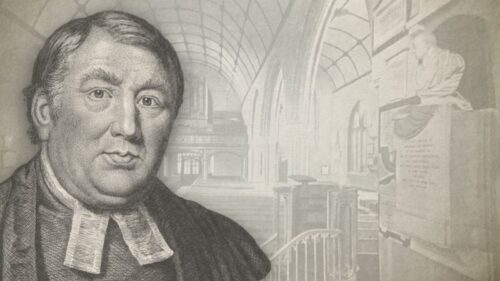
November 23—Morning Devotion
“If the Lord were pleased to kill us, he would not have received a burnt- offering and a meat-offering at our hands; neither would he have shewed us all these things.”—Judges 13:23
Precious faith this of the wife of Manoah, and sound and conclusive reasoning. My soul, hath the Father, who gave thee Jesus for a Saviour, accepted thee in Jesus? Hath the Father, who sent his dear Son to be the Saviour of the world, accepted Jesus for thy, Saviour? Hath the Holy Ghost shewed thee the glorious things of redemption in his blood, the forgiveness of sins according to the riches of his grace? And hath he given thee to believe in the record that “God hath given eternal life, and that this life is in his Son?” Oh then say, with the wife of Manoah, surely the Lord would never have done all this, neither would be have sheered me all these things, had be not intended my salvation Treasure up, then, these past tokens of favour: consider present evidences of mercy; and say, is not Jesus still precious? Are not my desires after him? And small as you sometimes think your hope, yet would you, my soul, relinquish it for a thousand worlds? Oh then, my soul, hang upon Jesus, cleave to Jesus, hold fast on Jesus. Never would the Lord have shewed me the beauty, glory, fulness, suitableness, and all-sufficiency of Jesus, nor enabled my soul to hold up Jesus in the arms of my faith for acceptance, if the Lord had been pleased to kill me.
Robert Hawker (1753-1827) was an Anglican (High-Calvinist) preacher who served as Vicar of Charles Church, Plymouth. John Hazelton wrote of him:
“The prominent features…in Robert Hawker's testimony…was the Person of Christ….Dr. Hawker delighted to speak of his Lord as "My most glorious Christ.” What anxious heart but finds at times in the perusal of the doctor's writings a measure of relief, a softening, and a mellowing? an almost imperceptible yet secret and constraining power in leading out of self and off from the misery and bondage of the flesh into a contemplation of the Person and preciousness of Christ as "the chiefest among ten thousand and the altogether lovely." Christ and Him crucified was emphatically the burden of his song and the keynote of his ministry. He preached his last sermon in Charles Church on March 18th, 1827, and on April 6th he died, after being six years curate and forty-three years vicar of the parish. On the last day of his life he repeated a part of Ephesians 1, from the 6th to the 12th verses, and as he proceeded he enlarged on the verses, but dwelt more fully on these words: "To the praise of His glory Who first trusted in Christ." He paused and asked, "Who first trusted in Christ?" And then made this answer: "It was God the Father Who first trusted in Christ."
Robert Hawker on the Biblical Covenants (Complete)
Robert Hawker's Poor Man's Morning Portions





